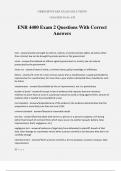©BRIGHTSTARS EXAM SOLUTIONS
11/16/2024 10:16 AM
ENR 4400 Exam 2 Questions With Correct
Answers
Civil - answer✔actions brought to enforce, redress, or protect private rights; all actions other
than criminal; law can be brought by private parties or the government
crime - answer✔considered an offense against government or society; law can only be
prosecuted by the government
mens rea - answer✔state of mind; a criminal intent; guilty knowledge or willfulness
felony - answer✔A crime of a more serious nature than a misdemeanor, usually punishable by
imprisonment in a penitentiary for more than a year and/or substantial fines; classified as such
by statue
misdemeanor - answer✔punishable by fine or imprisonment, not in a penitentiary
burden of proof - answer✔concept in law of evidence that requires that one introduce
evidence to prove facts at issue in a particular lawsuit to avoid a ruling against them; amount of
evidence that is needed to prove/defend a case
civil standard - answer✔preponderance of the evidence; the evidence demonstrates that the
proposition is more likely true than not true (51%)
criminal standard - answer✔beyond a reasonable doubt
tort law - answer✔law that deals with harm to a person or a person's property; civil wrong
(other than breach of contract) from which injury occurs to another (assault, battery, false
imprisonment, theft, negligence, etc.)
negligence tort - answer✔existence of legal duty from defendant to plaintiff, breach of that
duty, then damage as a proximate result; when a person commits a tort because they don't act
carefully enough
intentional tort - answer✔when a person commits a tort on purpose; nuisance, trespass, false
imprisonment
1|Page
, ©BRIGHTSTARS EXAM SOLUTIONS
11/16/2024 10:16 AM
comparative negligence - answer✔a theory in tort law under which the liability for injuries
resulting from negligent acts is shared by all parties who were negligent (including the injured
party), on the basis of each person's proportionate negligence
bundle of rights for property law - answer✔establishing whether the right exists, establishing
whether the rights have been violated, establishing a remedy, analyzing how the different
rights interact with each other
intangible property - answer✔property recognized by law even though it has no physical
existence
intellectual property - answer✔an intangible property, such as an expressed idea or concept,
that has commercial value; trademark, patents, copyright
trademark - answer✔the exclusive right to use a brand or part of a brand; has commercial value
patents - answer✔exclusive right to use, license or sell an invention; original creation
copyright - answer✔protects the expression of ideas rather than ideas themselves; books,
lyrics, photographs, songs; original creations
contract law - answer✔provide a mechanism by which society works; in a market economy,
they provide a means for work to get done, goods to be distributed, and labor and production
coordination; almost entirely civil cases of action
contract must be in writing to be enforceable (generally not) in these circumstances -
answer✔contract to pay someone else's debt, contract for the sale of an interest in land,
contract not to be performed within one year of time making, contract for sale of goods over
$500
breach of contract - answer✔The failure, without legal excuse, of a promisor to perform the
obligations of a contract, so the other party is relieved of performing its side of the bargain;
generally, damages ordered rather than specific performance
categories of law - answer✔criminal, civil, constitutional, education, healthcare, environmental,
labor and employment
Hamer v. Sidway - answer✔- Uncle becomes indebted to nephew after uncle promises nephew
$5,000 if he can refrain from drinking, using tobacco, swearing and playing cards or billiards for
money until age 21
- Nephew fulfills promise to refrain
2|Page




